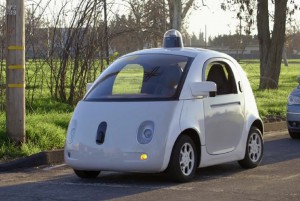
It appears that Google will no longer be producing a full self-driving car instead focusing on developing the technology for other companies.
Google is getting out of the automotive game, well, at least the part of it where it makes actual self-driving cars. The tech giant confirmed today it’s restructuring its auto business to focus on developing autonomous technology alone.
As part of the effort, it will be split off from Google and called WAYMO, according to John Krafcik, who took over Google’s self-driving car project earlier this year. Called “Chauffeur” internally, is focusing exclusively on incorporating its sensors into traditional vehicles.
“It’s sort of the best of both worlds,” Krafcik said, according to the Detroit News, while announcing the news at the tech giant’s office in San Francisco.
Krafcik said the newly formed unit is, “A self-driving technology company with a mission to make it safe and easy for people and things to move around.”
(Apple asks agency about autonomous autos. For more, Click Here.)
The move mirrors – allegedly – the strategy that Apple employed with Project Titan. Apple executives never confirmed the parameters of its automotive strategy, however, only hinting around that it would like to be more involved in the industry than Apple CarPlay.
While Google has logged more than 2 million miles of autonomous vehicle testing in multiple states, the final product was almost always assumed to be an actual vehicle – even if it didn’t have a steering wheel, brake pedal or gas pedal.

Automakers were being challenged by Google and Apple for superiority in the self-driving car market place. Now they're apparently looking to partner.
“Google focusing on the software and the technology for self-driving vehicles make more sense, since that is its expertise, than trying to be a full-fledged automaker,” said Autotrader analyst Michelle Krebs. “By supplying its technology to others, Google has the opportunity to proliferate self-driving vehicles in a way many others cannot.”
The Google Car project’s current fleet consists of dozens of Lexus SUVs and a few two-person pod-cars. However, that push didn’t prevent it from having discussions with automakers, such as Fiat Chrysler and others to perhaps act as the manufacturing arm of a joint operation to produce self-driving vehicles.
(Click Here for details about investors bolstering support of autonomous vehicle companies.)
Last May, the companies agreed to a deal where Google would outfit 100 Pacificas with self-driving technology in an effort to get more vehicles on the road and accelerate development. To date, none of those vehicles have been seen.
As part of that deal, Google purchased space in a building outside of Detroit that was to be home to the tech behemoth’s testing efforts outside of the West Coast. It was expected the recent passage of legislation in Michigan to allow fully autonomous vehicles to be tested without a safety driver would act as a catalyst for that development.
The program has undergone a steady stream of changes in recent months, but perhaps none as impactful as the departure of Chris Urmson, who was for so long the face of Google’s self-driving car efforts. It’s rumored that Urmson left to form his own self-driving vehicle technology company.
Regardless, the move into just the technology end of the business gives Google options as automakers as well as ride-sharing companies are eagerly awaiting the first autonomous vehicle. For automakers, it represents a leap forward in innovation and prestige that could generate new sales.
(Click Here for more on Uber’s autonomous test program.)
For ride-sharing firms, it means no drivers to pay and the ability to run vehicles 24 hours a day. The entire system could operate without humans, increasing profits.
